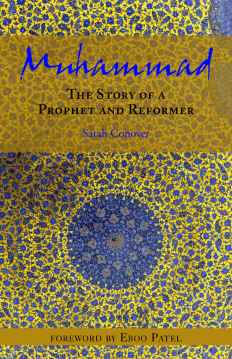
In “Muhammad: The Story of a Prophet and Reformer” Spokane author Sarah Conover illustrates why Muhammad is a beloved figure in Islam.
“The tale too often told about the Prophet Muhammad (peace be upon him) in our times is twisted to the point of deformation — which just makes ‘Muhammad: The Story of a Prophet and Refomer’ that much more meaningful and powerful’,” writes Eboo Patel, founder of the Interfaith Youth Core.
Conover said she wanted to humanize Muhammad for non-Muslims, including young adults.
“I felt this was really missing in the market; there are many books written about the Prophet Muhammad that assume you’re already a believer, so that’s hard for non-Muslims to step right into,” she said. “I was looking to make a bridge. There was nothing (written) that really puts him in a setting so you could see him as a human being, like you, like anyone.”
She starts the story with Aminah, Muhammad’s mother, who knew her son would become a great leader one day, and does her best to find him a good home. Conover introduces readers to the prophet’s adored uncle, Abu Talib, and recounts the romance between Muhammad and his first wife, Khadija. She narrates Muhammad’s encounter with the Angel Gabriel, describes his bravery when he begins to share his message, and then the ridicule and anguish he and his followers later endured.
Conover reconstructs Muhammad’s tale through scholarly research, creative writing and by drawing from her fond experiences visiting the Middle East, she said.
“So many of the things I love about Islam come from the first period of his life,” she said. “I’ve been to the Middle East a number of times and, you know, you have this reminder five times a day that you may not just be in charge of everything; there might be a greater power. It just gets in you.”
Conover, who has now authored seven books, chose to write about the prophet’s life up until the year 622, when he makes the journey from Mecca to Medina.
That’s when things got really complicated for Muhammad, she said.
“Things changed. He’s fighting for his life, for his religion’s survival. He becomes a warrior in a certain way, a political strategist and a prophet and all that gets mixed up. To explain that well, to contextualize it, you’re not going to do that for a multi-generational audience,” she said.
Conover said writing about Muhammad helped her better understand her Muslim friends’ reverence for the prophet. They see him, she said, not as a god, but as a divinely led person.
“I think we forget what it must have taken. What it takes to go against prevailing culture is tremendous. It’s a remarkable example to anybody, anytime,” she said.
Freda Shamma Crane, who co-authored “Ayat Jamilah: Beautiful Signs, A Treasury of Wisdom of Children and Parents” with Conover, said writing about Islam from an outside perspective is difficult and was initially concerned when Conover told her about her plans to write about Muhammad.
She said Conover did heaps of research, sought feedback and was careful not to let her Western perspective intrude on her writing.
“The result is a book which I believe accurately reflects the Arab desert culture of that time, as well as accurately portrays events that we have historical evidence of. Her writing is skilled storytelling, showing Prophet Muhammad as we Muslims see him,” she said.
Conover’s next project is a multi-generational book about Hinduism. She holds a Bachelor of Arts in religious studies from the University of Colorado, a degree in education from Gonzaga University and a Masters of Fine Arts in creative writing from Eastern Washington University. She also teaches local creative writing and meditation classes.
Conover will be doing a book reading of “Muhammad: The Story of a Prophet and Reformer” at Auntie’s Bookstore, 402 W. Main Ave, at 7 p.m. on Oct. 17.
*Sarah Conover is a Spokane Faith & Values contributor.









I am curious what a follower of Islam thinks about the book, maybe a review from our Muslim contributor?